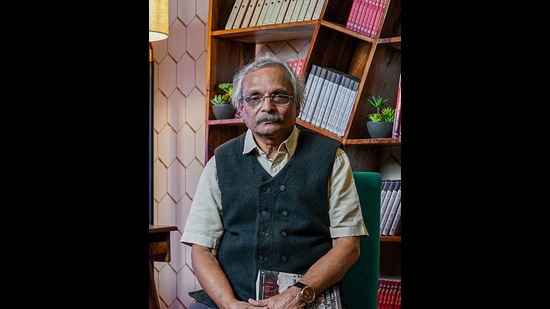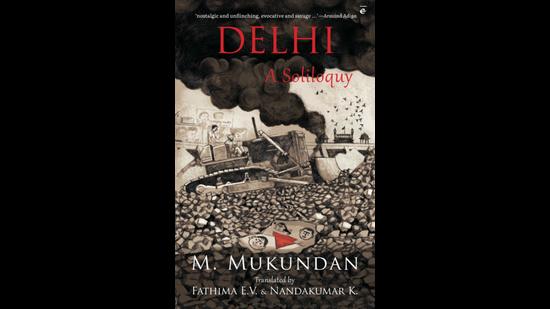Interview: M Mukundan, author, Delhi, A Soliloquy – “I always dream in Malayalam”
Winner of this year’s JCB Prize for Literature, M Mukundan talks about wandering the streets of Delhi, the power of translation, and contemporary Malayalam literature
Congratulations on winning the JCB Prize which is indeed well deserved for your remarkable novel, Delhi: A Soliloquy. The last recipient of the prize was also a Malayalam writer, S Hareesh for his novel, Moustache (2020). Awards bring visibility but how are these awards, which primarily recognize writing in English and English translation, perceived in the sphere of Malayalam writing in Kerala? Do they influence public opinion?

In Kerala, we have so many awards, small and big. The JCB Prize for literature is incomparable, because of its sheer magnitude. It is now viewed as the most coveted award for literature in India. When such an award is conferred on a writer, it throws light on him and his work. His voice will hereafter be easily heard and he can reach a large number of readers beyond the borders of language and cultures. The English translation helps the writer of a regional language to break free of isolation and enter mainstream Indian literature. When a regional writer wins the JCB Award he instantly becomes a national writer. This is the impression I have gathered from readers in Kerala since I won this award.
If you were to rewrite your novel set in contemporary Delhi, what would change and how? Would Sahadevan, the central character in your novel, behave differently in contemporary Delhi?
Unfortunately, contemporary Delhi conjures up a grotesque image in me. It doesn’t at all stir creativity. That is why I think I can never write another novel about present-day Delhi in spite of my undying love for the city. Rather than living there, Sahadevan would happily go back home to Kerala, where he can at least breathe fresh air and walk around the town past midnight without the fear of getting mugged, assaulted. If, one day, I am forced to write about contemporary Delhi, I would rather try to write a non-fiction work, something like Suketu Mehta’s Maximum City about Mumbai, although it is an extremely difficult endeavour.
Your novel is a record of various events in the history of the city and the nation. I would say a similar impulse informs your other writing too. I am thinking of On the banks of Mayazzhi amongst other titles. Do you write to document? Is history an important impulse in your writing? Or do you write to examine the past?
I love to look at history as if it were a living entity. Some places are throbbing with history, like my Mayyazhi and Delhi. When I belong somewhere I feel like writing about it and history seeps down to the work. In my novels, I have no intention to document history. I leave it to historians. What I do is recreate history giving it a body and a soul. In Delhi: A Soliloquy, history is as important a personage as Sahadevan.

I find the translation by Fathima EV and Nandakumar K absolutely brilliant. How did you work with the translators? Could you walk us through the translation process?
I was very keen to have my Delhi novel translated into English so that a larger readership could access it and I was in search of a creative translator. Fathima was my first choice. She is a brilliant translator, who has already won the Crossword Award for the English version of Subhash Chandran’s novel A Preface to Man. As she was busy she decided to co-translate the Delhi novel with Nandakumar K, equally brilliant. Together they have realised a wonderful translation. They always consulted me in the process of translation to avoid even a tiny bit of ambiguity getting trapped between the lines.
I am also interested to know about the language employed in the novel. You wrote a Malayalam novel about Delhi, a city where Hindi is spoken widely amongst other Indian languages. How did you write and think in Malayalam while living in Delhi?
In day-to-day life, I used to speak four languages, Malayalam at home, French in my office, English with friends and Hindi in the vegetable market. But I always dream in Malayalam. I can write a novel only in the language I dream in. So the entire Delhi novel was thought up in Malayalam. In the original work as well as its English translation, non-Malayali characters speak a mixture of Hindi and Malayalam/English. I thought this way they could retain their Hindiness to some extent at least.
Read more: Review: Delhi - A Soliloquy by M Mukundan
You mentioned that Delhi… is a novel about poor people whose lives are very different from your own. How did you then go about creating the minutiae of those lives in your novel?
Whenever I got some free time, I wandered in old Delhi and in other places inhabited by the poor. I spent so many days walking in the dark lanes of the Jama Masjid area; I saw in what sort of wretchedness they lived. Poverty and suffering awaken the writer in me. Way back as a debutant writer, I told myself that I could never write about happy people.
There is a lot of discussion about new generation Malayalam cinema for its content and powerful storytelling. Would you say that Malayalam writing too has witnessed a similar resurgence in recent times?
In the olden days when modernity raged, writers wrote with a universal perspective. The characters they created had neither religion nor caste. Now what we see in the Malayalam literature is the reversal. Young writers focus on local content. Writing is being provincial so naturally, caste there plays a role. Young writers are bringing out very powerful stories and novels, like S Hareesh, author of Moustache.
Kunal Ray teaches literary & cultural studies at FLAME University, Pune.





